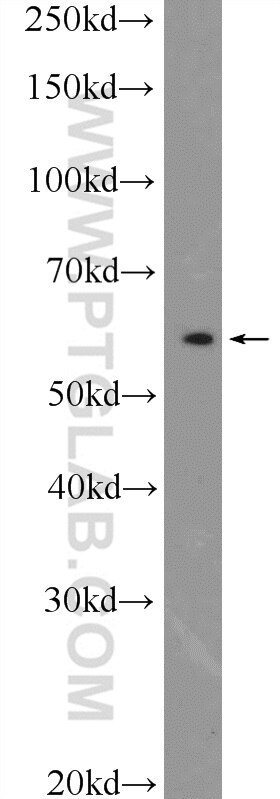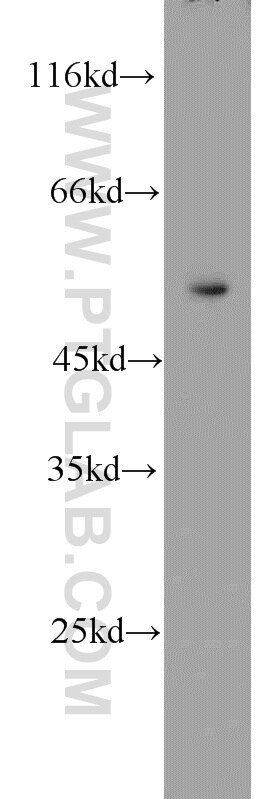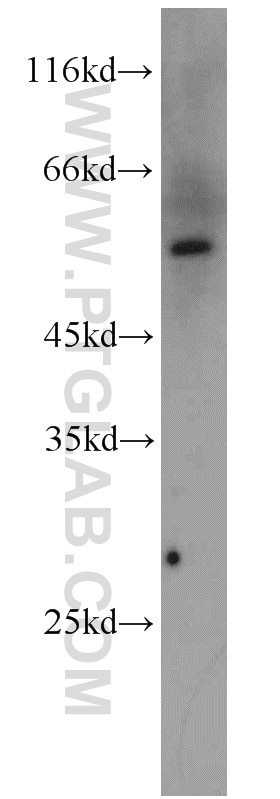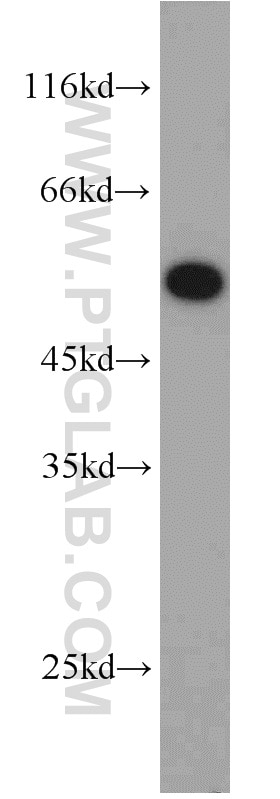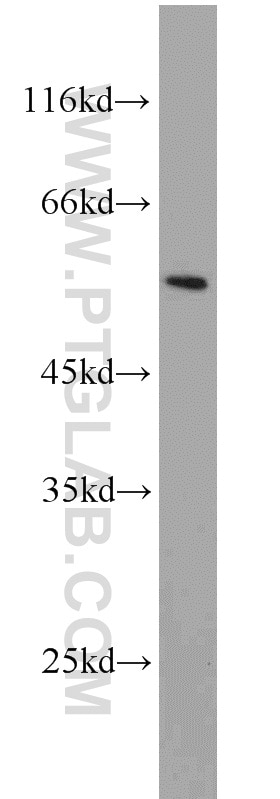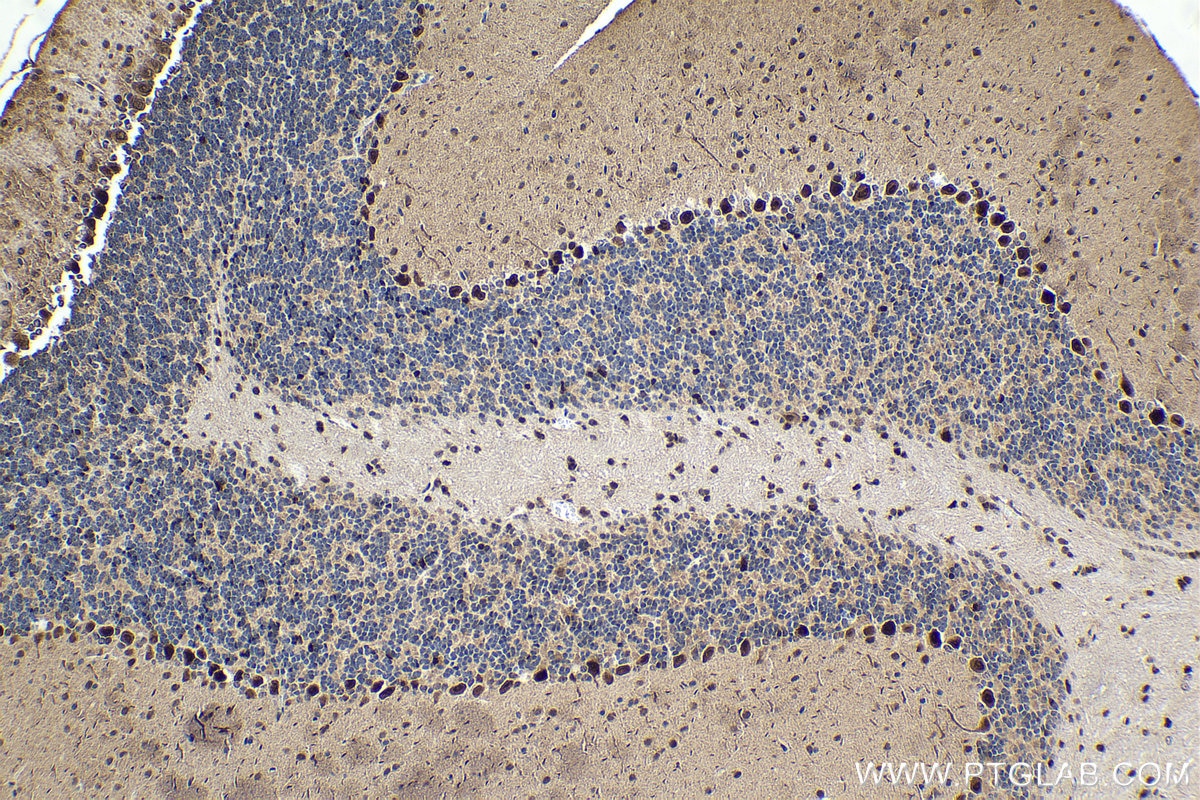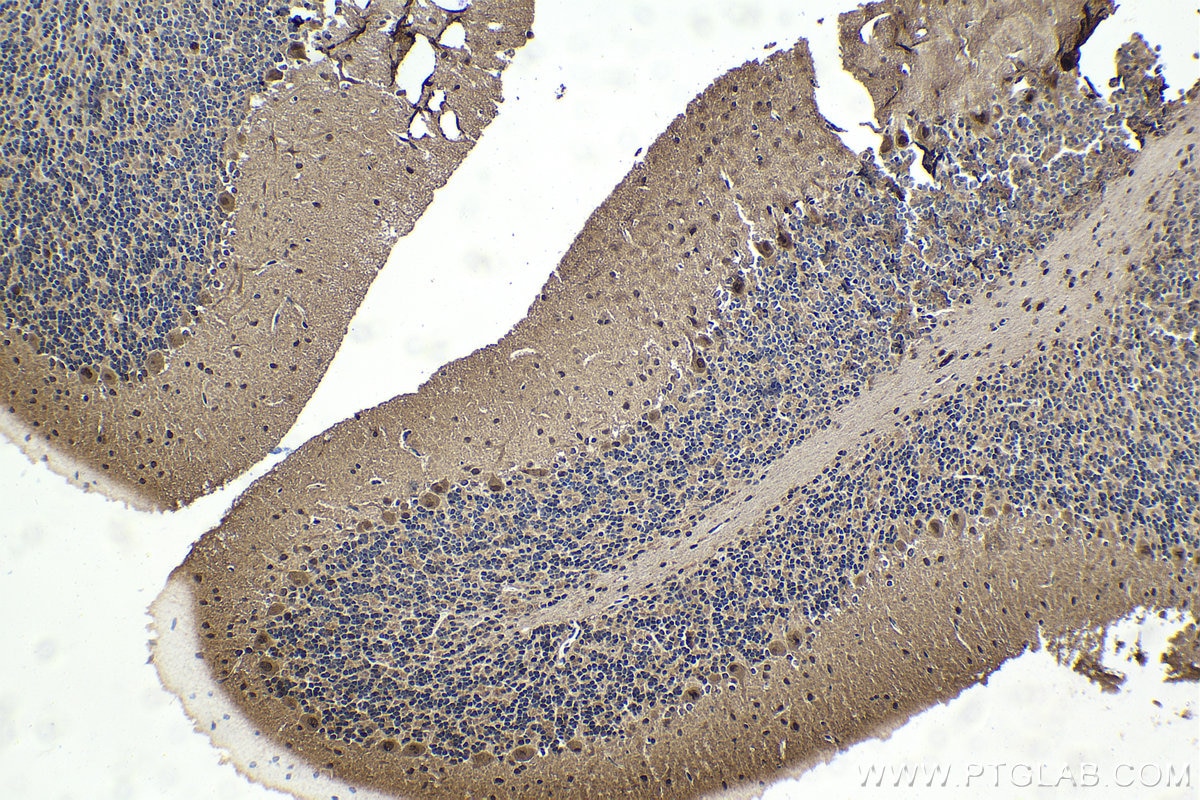PSMC1 Polyklonaler Antikörper
PSMC1 Polyklonal Antikörper für WB, IHC, ELISA
Wirt / Isotyp
Kaninchen / IgG
Getestete Reaktivität
human, Maus, Ratte
Anwendung
WB, IHC, ELISA
Konjugation
Unkonjugiert
Kat-Nr. : 11196-1-AP
Synonyme
Geprüfte Anwendungen
| Erfolgreiche Detektion in WB | Maushirngewebe, A549-Zellen, HeLa-Zellen, Jurkat-Zellen, Mauslungengewebe |
| Erfolgreiche Detektion in IHC | Maus-Cerebellum-Gewebe Hinweis: Antigendemaskierung mit TE-Puffer pH 9,0 empfohlen. (*) Wahlweise kann die Antigendemaskierung auch mit Citratpuffer pH 6,0 erfolgen. |
Empfohlene Verdünnung
| Anwendung | Verdünnung |
|---|---|
| Western Blot (WB) | WB : 1:500-1:2000 |
| Immunhistochemie (IHC) | IHC : 1:50-1:500 |
| It is recommended that this reagent should be titrated in each testing system to obtain optimal results. | |
| Sample-dependent, check data in validation data gallery | |
Veröffentlichte Anwendungen
| WB | See 6 publications below |
Produktinformation
11196-1-AP bindet in WB, IHC, ELISA PSMC1 und zeigt Reaktivität mit human, Maus, Ratten
| Getestete Reaktivität | human, Maus, Ratte |
| In Publikationen genannte Reaktivität | human, Maus, Ratte |
| Wirt / Isotyp | Kaninchen / IgG |
| Klonalität | Polyklonal |
| Typ | Antikörper |
| Immunogen | PSMC1 fusion protein Ag1677 |
| Vollständiger Name | proteasome (prosome, macropain) 26S subunit, ATPase, 1 |
| Berechnetes Molekulargewicht | 49 kDa |
| Beobachtetes Molekulargewicht | 52-57 kDa |
| GenBank-Zugangsnummer | BC016368 |
| Gene symbol | PSMC1 |
| Gene ID (NCBI) | 5700 |
| Konjugation | Unkonjugiert |
| Form | Liquid |
| Reinigungsmethode | Antigen-Affinitätsreinigung |
| Lagerungspuffer | PBS with 0.02% sodium azide and 50% glycerol |
| Lagerungsbedingungen | Bei -20°C lagern. Nach dem Versand ein Jahr lang stabil Aliquotieren ist bei -20oC Lagerung nicht notwendig. 20ul Größen enthalten 0,1% BSA. |
Hintergrundinformationen
PSMC1(26S protease regulatory subunit 4) is also named as p26s4 and belongs to the AAA ATPase family.The 26S protease is involved in the ATP-dependent degradation of ubiquitinated proteins. The regulatory (or ATPase) complex confers ATP dependency and substrate specificity to the 26S complex.
Protokolle
| PRODUKTSPEZIFISCHE PROTOKOLLE | |
|---|---|
| WB protocol for PSMC1 antibody 11196-1-AP | Protokoll herunterladen |
| IHC protocol for PSMC1 antibody 11196-1-AP | Protokoll herunterladenl |
| STANDARD-PROTOKOLLE | |
|---|---|
| Klicken Sie hier, um unsere Standardprotokolle anzuzeigen |
Publikationen
| Species | Application | Title |
|---|---|---|
Oncogene The degradation of p53 and its major E3 ligase Mdm2 is differentially dependent on the proteasomal ubiquitin receptor S5a. | ||
Cell Mol Life Sci The insulin-degrading enzyme is an allosteric modulator of the 20S proteasome and a potential competitor of the 19S. | ||
PLoS One Inactive USP14 and inactive UCHL5 cause accumulation of distinct ubiquitinated proteins in mammalian cells. | ||
Neuropathology Adenoviral expression of TDP-43 and FUS genes and shRNAs for protein degradation pathways in rodent motoneurons in vitro and in vivo. | ||
Cell Death Dis Dihydrolipoamide dehydrogenase (DLD) is a novel molecular target of bortezomib |
